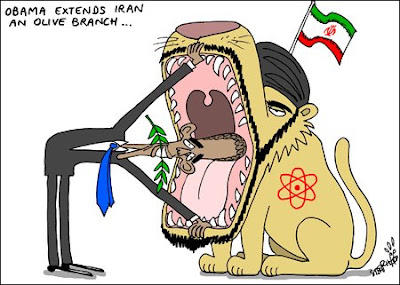Edited by Joanne Hanrahan

I do not think there has been a president as puzzled as the American President Barack Obama! This puzzlement, I can say, is caused by Iran. That is to say, Obama had a lot of faith in the policy of extending a hand to Iranians in order to contain the Iranian nuclear problem. However, day in and day out, this policy is proving fruitless. It has only caused an already wrong-headed Iran to refuse any concessions. In response to the resolution of the International Atomic Energy Agency’s (IAEA) Board of Governors that slammed Iran, the Iranian government said it was willing to build 10 uranium enrichment plants for medical research, in addition to producing nuclear fuel that exceeds the needs of Tehran’s reactor.
In this sense, some Americans see these developments as an indication of failure of the policy of dialogue that Obama adopted to defuse the Iranian nuclear crisis. For this reason, they say, Washington will have to approach Iran differently by replacing dialogue and negotiations with sanctions and military action-based threats. The viewpoint of Republicans in America (and some Democrats too!), as well as Israel, is that this is the best way to deal with Iranians, who should be cornered until forced to retreat and make concessions.
On the other hand, there is an opposing party, which fears that any further threat would result in more Iranian stubbornness. Those people stick to the view that Dr. Muhammad El Baradei (former director of IAEA) openly expressed before leaving office. This idea was proven to be accurate when the IAEA issued a resolution warning Iran against reducing its level of cooperation with the IAEA in its execution of new nuclear projects. The IAEA didn’t give Iran the opportunity to confer on or approve of the resolution, and the result was to increase Iranian intransigence. This pro-Baradei party is zealous in extending dialogue deadlines even more, remembering the fact that Henry Kissinger took more than a year to get a positive response from China, while true dialogue with Iranians started only a few weeks ago in Geneva, and have included only two sessions of talks.
Actually, this party does not have so much to fear about the Iranians making use of this extended time. They believe that Iran’s technical level in nuclear projects is still immature. Even the uranium they enriched by 3-5 percent still contains impurities that could affect Iranian enrichment plants should they think of stepping up enrichment by 20 percent to produce all the nuclear fuel they need. Only then would Iran have to send their uranium abroad to be re-enriched, something they previously consented to before suggesting that they exchange uranium with nuclear fuel inside Iran itself.
However, there is a third opinion, which holds that there will be no use in extending the dialogue with Iran. Some people think Americans will have to wait a long time to reach a compromise with Iran, and even so, eventually, there will be no such thing. Iran’s internal situation (election protests and other internal issues) complicates the problem and handcuffs the Iranian regime, preventing it from adopting an open attitude toward the West regarding the nuclear issue.
In summary, and in the shadow of this current political rift, more extremist forces are surfacing in the Iranian regime, including the Islamic Revolutionary Guard Corps (IRGC), which believes that any reconciliation with America and the West will ultimately be to the benefit of reformists. This would deprive the IRGC of its basic weapon – antagonism between Iran and the West, especially America. Perhaps this was the reason why Khomeini and Ahmedinejad reneged their consent to Al Baradei’s proposal to enrich Iranian uranium outside Iran.
That is why those who hold this last viewpoint think that Obama will have to re-start the dialogue with Iran. He will have to have some real threats on the table as long as dialogue alone is useless, but military action is not such an easy step.

Leave a Reply
You must be logged in to post a comment.